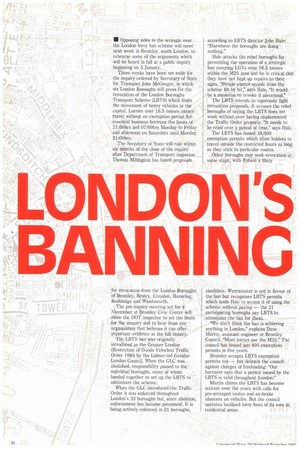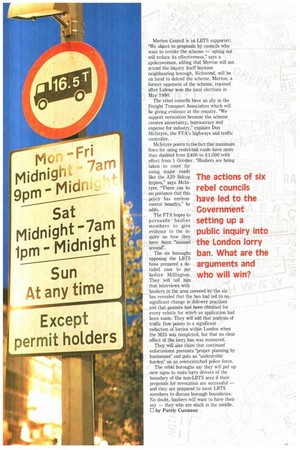LO N DON'S
Page 26

Page 27

If you've noticed an error in this article please click here to report it so we can fix it.
ANN NG
Mi Opposing sides in the wrangle over the London lorry ban scheme will meet next week in Bromley, south London, to rehearse some of the arguments which will be heard in full at a public inquiry beginning on 5 January, Three weeks have been set aside for the inquiry ordered by Secretary of State for Transport John McGregor, in which six London Boroughs will press for the revocation of the London Boroughs Transport Scheme (LBTS) which limits the movement of heavy vehicles in the capital. Lorries over 16.5 tonnes cannot travel without an exemption permit for essential business between the hours of 21:00hrs and 07:00hrs Monday to Friday and afternoon on Saturdays until Monday 21:00hrs.
The Secretary of State will rule within six months of the close of the inquiry after Department of Transport inspector Thomas Millington has heard proposals for revocation from the London Boroughs of Bromley, Bexley, Croydon, Havering, Redbridge and Wandsworth.
The pre-inquiry meeting set for 4 November at Bromley Civic Centre will allow the DOT inspector to set the limits for the enquiry and to hear from any organisation that believes it can offer important evidence at the full inquiry.
The LBTS ban was originally introduced as the Greater London (Restriction of Goods Vehicles) Traffic Order 1985 by the Labour-led Greater London Council. When the GLC was abolished, responsibility passed to the individual boroughs, many of whom banded together to set up the LBTS to administer the scheme.
When the GLC introduced the Traffic Order it was enforced throughout London's 33 boroughs but, since abolition, enforcement has become piecemeal. It is being actively enforced in 21 boroughs, according to LBTS director John Hale: "Elsewhere the boroughs are doing nothing."
Hale attacks the rebel boroughs for preventing the operation of a strategic ban covering LGVs over 16.5 tonnes within the M25 area and he is critical that they have not kept up repairs to their signs. "People cannot secede from the scheme bit by bit," says Hale, "It would be a nonsense to revoke it piecemeal."
The LBTS intends to vigorously fight revocation proposals. It accuses the rebel boroughs of saying the LBTS does not work without ever having implemented the Traffic Order properly. "It needs to be tried over a period of time," says Hale.
The LBTS has issued 38,000 exemption permits which allow holders to travel outside the restricted hours as long as they stick to particular routes.
Other boroughs may seek revocation at some stage, with Enfield a likely candidate. Westminster is not in favour of the ban but recognises LBTS permits which leads Hale to accuse it of using the scheme without paying — the 21 participating boroughs pay LBTS to administer the ban for them.
"We don't think the ban is achieving anything in London," explains Dave Martin, assistant engineer at Bromley Council. "Most lorries use the M25." The council has issued just 400 exemption permits in five years.
Bromley accepts LBTS exemption permits too — but defends the council against charges of freeloading: "Our barrister says that a permit issued by the LBTS is valid throughout London."
Martin claims the LBTS has become stricter over the years with calls for pre-arranged routes and air-brake silencers on vehicles. But the council operates localised lorry bans of its own in residential areas. Merton Council is an LBTS supporter: "We object to proposals by councils who want to revoke the scheme — opting out will reduce its effectiveness," says a spokeswoman, adding that Merton will not attend the inquiry itself because neighbouring borough, Richmond, will be on hand to defend the scheme. Merton, a former opponent of the scheme, rejoined after Labour won the local elections in May 1990.
The rebel councils have an ally in the Freight Transport Association which will be giving evidence at the enquiry. "We support revocation because the scheme creates uncertainty, bureaucracy and expense for industry," explains Don McIntyre, the FTA's highways and traffic controller.
McIntyre points to the fact that maximum fines for using restricted roads have more than doubled from £400 to £1,000 with effect from I. October. "Hauliers are being taken to court for using major roads like the A20 Sidcup bypass," says McIntyre. "There can be no pretence that this policy has environmental benefits," he adds.
The FTA hopes to persuade haulier members to give evidence to the inquiry on how they have been "messed around".
The six boroughs opposing the LBTS have prepared a detailed case to put before Millington. They will tell him that interviews with hauliers in the area covered by the six has revealed that the ban had led to no significant change in delivery practices and that permits had been obtained for every vehicle for which an application had been made. They will add that analysis of traffic flow points to a significant reduction of lorries within London when the M25 was completed, but that no clear effect of the lorry ban was measured.
They will also claim that continued enforcement prevents "proper planning by businesses" and puts an "undesirable burden" on an overstretched police force.
The rebel boroughs say they will put up new signs to warn lorry drivers of the boundary of the non-LBTS area if their proposals for revocation are successful — and they are prepared to meet LBTS members to discuss borough boundaries. No doubt, hauliers will want to have their say — they who are stuck in the middle. El by Patric Cunnane
The actions of six rebel councils have led to the Government setting up a public inquiry into the London lorry ban. What are the arguments and who will win?
















































































